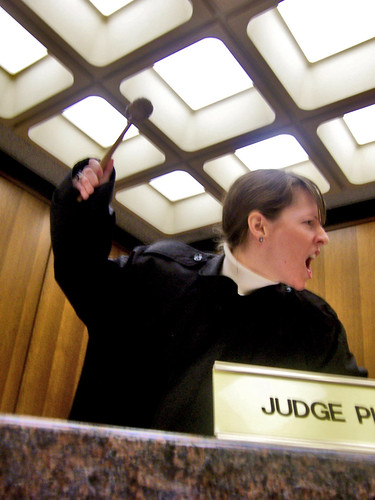We run our website the way we wished the whole internet worked: we provide high quality original content with no ads. We are funded solely by your direct support. Please consider supporting this project.
Court-of-Law Theology: How It Falls Short
Courtney “Coco” Mault via Compfight
Last week, we introduced a way of talking about theology with concentric circles. This approach is distinct from the common Western model of theology that depends upon a court-of-law framework. The following is an excerpt from Greg’s book Benefit of the Doubt regarding this:
____________________________
Within the legal strand of the Western theological tradition, God is viewed primarily as a judge, humans are thought of as guilty defendants, and Jesus is conceived of as a sort of defense attorney. Within this court-of-law framework, the atonement (that is, what Jesus accomplished on the cross) is construed as a sort of legal loophole that our defense lawyer worked out with the judge that somehow gets us off the hook by allowing the father to punish him instead of us. And our salvation, purchased by Jesus’ substitutionary death, is envisioned as an acquittal that allows us to avoid being sentenced by the Judge and consigned to prison (hell) forever.
“What’s wrong with that?” Some readers are undoubtedly wondering? “That’s the very view I was taught!” Well, it’s not entirely wrong. The New Testament does use some legal metaphors in describing God in a relationship with him. For example, God is depicted as a judge. Jesus is once referred to as our advocate before God (1 John 2:1). And the atonement is several times expressed in quasi-legal terms (e.g., Romans 3:25; Hebrews 9:15). At the same time, these legal metaphors are conceived of within a broader and more dominant covenantal context. …
You can see the pervasiveness of the court–of–law paradigm for theology in the sorts of questions Christians tend to ask. For example, I can’t tell you how many times people have asked me to specify exactly what they need to believe in order to be “saved.” Some have seriously wondered if a person who denies biblical inerrancy or who denies the earth was created in six literal days can be “saved.” A religious television personality recently suggested on his show that I was going to hell because I disagree with his interpretation of hell, and I’ve several times heard people suggest that I and anyone else who denied the “penal substitution” interpretation of the atonement were at least likely not saved. And, most disconcerting of all, as our country has become increasingly politically polarized over the last several decades, I’ve encountered more and more people who seriously question the salvation of sisters and brothers in Christ who espouse different political opinions! …
Other questions and concerns Christians commonly raise today reflect the same framework. If I had a quarter for every time I’ve been asked about “eternal security,” for example, I’d be a fairly wealthy man. Can a person lose their salvation? If so, what are the specific conditions for this qualification? What specific sins can cause one to become unsaved? …
The same holds true of the multitude of legal–type questions that I and other pastors regularly get about what exactly constitutes a particular sin. To no one’s surprise, at the top of the list are questions about what technically constitutes “fornication.” How far can a couple go before they’ve “crossed the line”? I’ve met a significant number of unmarried people who have convinced themselves that, so long as a couple stops short of vaginal penetration, they have not technically had “sex.” It took me quite a while to accept that certain unmarried couples were not joking when they would tell me some of the sexually intimate things they do while allegedly avoiding “sex”—some of which would make many married couples blush! But they are serious! This is what happens when people frame their relationship with God in terms of a legal contract. Reasoning like clever lawyers, they assume that if the acquittal-contract doesn’t explicitly close a loophole they’ve uncovered, they have the “right” to take it with impunity. (116-119)
Category: General
Tags: Benefit of the Doubt, Doubt, Faith, Theology
Related Reading

Is Suffering Part of God’s Secret Plan?
In the Christian tradition since Augustine, the most common explanation for the apparent arbitrariness of life and God’s interaction with humanity has been God’s mysterious will—his “secret plan,” as Calvin says. Whether or not a child is born healthy or a wife is killed by an intruder is ultimately decided by God. If we ask…

When Free Will Meets Unfathomable Evil
In the face of tragedy Christians unfortunately tend to recite clichés that attempt to reassure people that, however terrible things seem, everything is unfolding according to God’s mysterious plan. We hear that “God has his reasons”; “God’s ways are not our ways”; “God is still on his throne”; “God doesn’t make mistakes,” and things of…

Drum Roll Please: Greg’s Final Critique of Bart Ehrman’s Article
This is the ninth and final of several videos Greg put together to refute Bart Ehrman’s claims published in the article What Do We Really Know About Jesus? Thanks for hanging in there for this last one. I know it was a long wait, but the holidays got inordinately busy for Greg. In this segment, Greg talks…

Sermon Clip: God In The Gallows
Greg has recently returned from a three week trip in Europe, and today he shares stories of how the Kingdom message of a Jesus-looking God, radical love and non-violence is truly spreading all over the world. You can view the full sermon here: http://whchurch.org/sermons-media/sermon/god-in-the-gallows

Our Commitment to Love (and Avoiding Theological Idolatry)
Given that we have just launched ReKnew, I thought it would be helpful to spend a good portion of our initial blogs unpacking the theological vision of ReKnew. Our goal is to post content to the site at least three or four times a week, with two of these posts (on average) being fresh content from me addressing particular theological topics. The other posts will be things such as videos, quotes of the day, featured articles from elsewhere on the web questions from readers, and so on.
Before I begin unpacking ReKnew’s theological vision in subsequent posts, however, today I want to offer four preliminary words about the theological convictions I’ll be espousing.

Greg’s Interview on The Christian Transhumanist Podcast
Here is an interview I did for The Christian Transhumanist Podcast that I wanted to share with all of you. Micah Redding and I discuss everything from Relativity Theory to Politics. I think you’ll find it interesting, but I want to offer a word of clarification before you listen. At one point in this interview…

